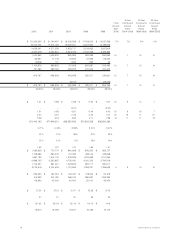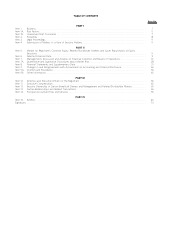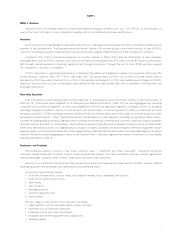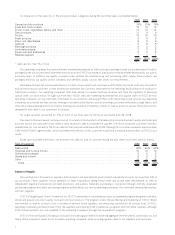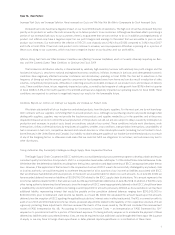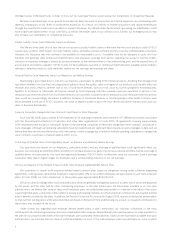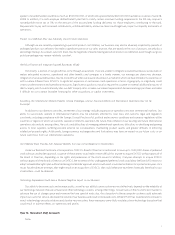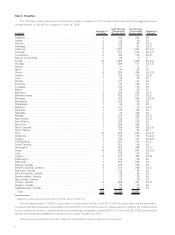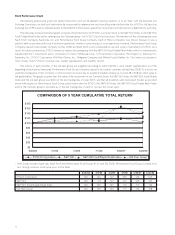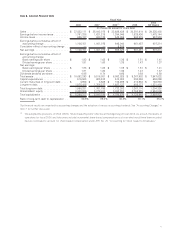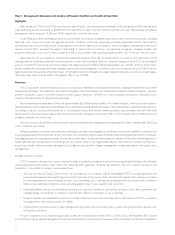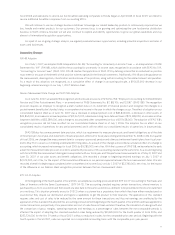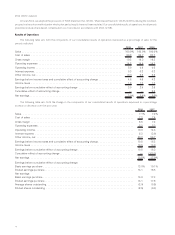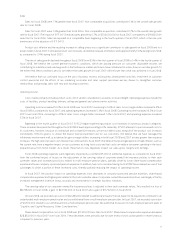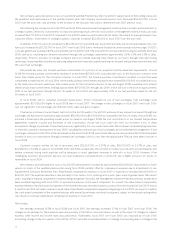Sysco 2008 Annual Report Download - page 31
Download and view the complete annual report
Please find page 31 of the 2008 Sysco annual report below. You can navigate through the pages in the report by either clicking on the pages listed below, or by using the keyword search tool below to find specific information within the annual report.appear to be underfunded, could be as much as $140,000,000, of which only approximately $22,000,000 has been accrued as of June 28,
2008. In addition, if a multi-employer defined benefit plan fails to satisfy certain minimum funding requirements, the IRS may impose a
nondeductible excise tax of 5% on the amount of the accumulated funding deficiency for those employers contributing to the fund.
Requirements to pay such increased contributions, withdrawal liability, and excise taxes could negatively impact our liquidity and results of
operations.
Product Cost Deflation May also Adversely Impact Future Operations
Although we are currently experiencing a period of product cost inflation, our business may also be adversely impacted by periods of
prolonged product cost deflation. We make a significant portion of our sales at prices that are based on the cost of products we sell plus a
percentage markup. As a result, our profit levels may be negatively impacted during periods of product cost deflation, even though our gross
profit percentage may remain relatively constant.
We Must Finance and Integrate Acquired Businesses Wisely
Historically, a portion of our growth has come through acquisitions. If we are unable to integrate acquired businesses successfully or
realize anticipated economic, operational and other benefits and synergies in a timely manner, our earnings per share may decrease.
Integration of an acquired business may be more difficult when we acquire a business in a market in which we have limited or no expertise, or
with a culture different from SYSCO’s. A significant expansion of our business and operations, in terms of geography or magnitude, could
strain our administrative and operational resources. Significant acquisitions may also require the issuance of material additional amounts of
debt or equity, which could materially alter our debt to equity ratio, increase our interest expense and decrease earnings per share, and make
it difficult for us to obtain favorable financing for other acquisitions or capital investments.
Expanding into International Markets Presents Unique Challenges, and our Expansion Efforts and International Operations may not be
Successful
In addition to our domestic activities, an element of our strategy includes expansion of operations into new international markets. Our
ability to successfully operate in international markets may be adversely affected by local laws and customs, legal and regulatory
constraints, including compliance with the Foreign Corrupt Practices Act, political and economic conditions and currency regulations of the
countries or regions in which we currently operate or intend to operate in the future. Risks inherent in our existing and future international
operations also include, among others, the costs and difficulties of managing international operations, difficulties in identifying and gaining
access to local suppliers, suffering possible adverse tax consequences, maintaining product quality and greater difficulty in enforcing
intellectual property rights. Additionally, foreign currency exchange rates and fluctuations may have an impact on our future costs or on
future cash flows from our international operations.
Our Preferred Stock Provides Anti-Takeover Benefits that may not be Beneficial to Stockholders
Under our Restated Certificate of Incorporation, SYSCO’s Board of Directors is authorized to issue up to 1,500,000 shares of preferred
stock without stockholder approval. Issuance of these shares could make it more difficult for anyone to acquire SYSCO without approval of
the Board of Directors, depending on the rights and preferences of the stock issued. In addition, if anyone attempts to acquire SYSCO
without approval of the Board of Directors of SYSCO, the existence of this undesignated preferred stock could allow the Board of Directors to
adopt a shareholder rights plan without obtaining stockholder approval, which could result in substantial dilution to a potential acquirer. As a
result, hostile takeover attempts that might result in an acquisition of SYSCO, that could otherwise have been financially beneficial to our
stockholders, could be deterred.
Technology Dependence Could have a Material Negative Impact on our Business
Our ability to decrease costs and increase profits, as well as our ability to serve customers most effectively, depends on the reliability of
our technology network. We use software and other technology systems, among other things, to load trucks in the most efficient manner to
optimize the use of storage space and minimize the time spent at each stop. Any disruption to these computer systems could adversely
impact our customer service, decrease the volume of our business and result in increased costs. While SYSCO has invested and continues to
invest in technology security initiatives and disaster recovery plans, these measures cannot fully insulate us from technology disruption that
could result in adverse effects on operations and profits.
Item 1B. Unresolved Staff Comments
None.
7


